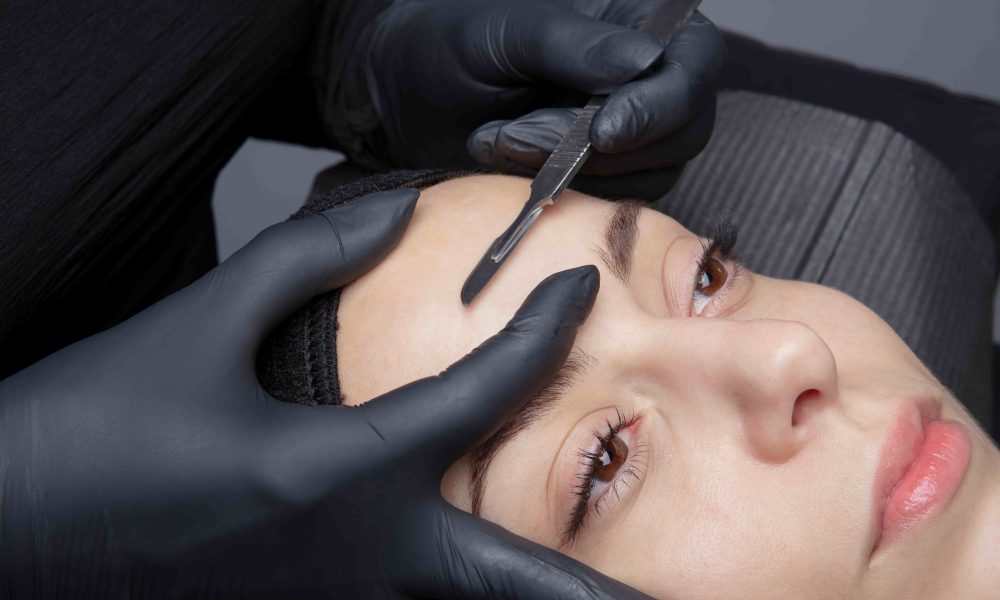

Dermaplaning is one of today’s hottest skin care services and modern approaches in the industry right now. It has been so popular that you’ve probably overheard your loved one or friends, among others. They might be raving about how their skins became soft and smooth and eventually felt after their dermaplaning treatment. It is not new, though. For decades, women in Japan have already been utilizing facial treatments as “shaving” regimens for anti-aging. However, only recently has it taken the Western world by storm.
Today, let us know more about this skin treatment, how it works, and how to prepare for it. Read until the end and discover if dermaplaning can work for your skin concerns.
Dermaplaning is a maximum physical method of exfoliation that gently removes dead skin cells and vellus facial hair by stroking a blade along the skin. Sounds scary? We hear you. But honestly, it’s nothing short of spectacular. When performed by a trained professional, we must stress that you should only trust trained, licensed professionals in dealing with your dermaplaning procedures. With this assurance, the results leave your skin feeling baby soft, radiant, and more youthful than before you entered the spa.
If you look at the tool used for dermaplaning treatments, you may notice it looks like a razor you would use on your body hair. The basic concept of dermaplaning is the same as shaving. Aiming a sterile blade at a 45-degree angle and dragging it slowly across your skin removes dead cells, scar tissue, and other debris that may make your skin’s surface look uneven.
Your skin is exposed daily to harsh environmental toxins, irritants, and sun damage. This condition can cause the top layer of your skin to appear dull, making you look aged. Dermaplaning clears away those damaged skin cells, so newer skin cells are what you see when you look in the mirror.
Exfoliation and hair removal can leave your skin brighter and smoother. Dermaplaning treatment can soften wrinkles and fine lines. Furthermore, it can ease hyperpigmentation or uneven skin tone. It’s also used to treat deep acne scars. How well it works depends on your skin type, tone, and medical history.
Before any exfoliation treatment, it’s essential to determine the dos and don’ts before and after the service.
If this time will be your first for a dermaplaning session, seeking professional advice is in your best interest before scheduling a treatment. While there is little downtime and hardly any contraindications for dermaplaning, a pre-service chat is always advised.
At-home facial care can yield at least 50% of practical results. When using any products with retinol, exfoliating serums, enzymes, facial polishes, or scrubs – discontinue use. Over-exfoliation can cause acne breakouts, hyper or hypopigmentation, dry skin, and redness. Our skin cells take time to renew, and you must allow them to do so before receiving a full exfoliation dermaplaning service.
If you have ever shaved over sunburns, you’ll know how our next point would feel. Imagine doing this step with a blade at least ten times (10x) sharper than an at-home razor. At the same time, we recommend sun exposure, although, in moderation, it can damage cells and leave them more sensitive than usual.
You probably found this article and are reading it now because you care much about your skin’s health and longevity. With that said, you may be receiving Botox or filler to enhance your beauty. Do not schedule your injectable services before obtaining dermaplaning treatments.
Botox treatments have a 4-hour window after receiving injections where you cannot lie down. After filler, you must wait 3-4 days to receive any facial treatments to ensure the placement of the product.
This one’s easy. We’re using a sterile scalpel blade to remove hair and skin cells – we do not want to shave over open wounds. If you are still deciding if you should reschedule, send your service provider some photos of your skin and let her assess.
Do not show up on the day of your appointment with open acne or lesions. Your meeting will undoubtedly be rescheduled, and you may be subject to a cancellation fee.
Accutane increases the fragility and sensitivity of the skin. The risk for infection, trauma, or damage is more significant while taking this medication and the duration it takes for it to be removed from your system thoroughly.
Advisement is to wait 6-12 months after completion before receiving any treatments that remove epidermal skin cells (waxing, microdermabrasion, dermaplaning).
Spread the great news about dermaplaning to your loved ones – family members, close friends, even school pals, classmates, workmates, and colleagues! Yes, we’re sure it would be nice to give all your family and friends skin envy, but let’s support sharing love. Tell your friends so they can try it out and have some fun too. Make it an event and take your best friend with you!
Most of those who have already received the procedure have little to no irritation or reaction after their dermaplaning treatments. Short-term side effects may include:
It’s rare for your hair to grow back thicker or darker. But in rare cases, dark hair may grow near your chin or “sideburns.” On the other hand, dermaplaning isn’t recommended if you have inflammatory skin conditions such as:
In addition, if you’re taking isotretinoin, a prescription medication used to treat severe acne, you should wait six (6) months after you stop taking it to try dermaplaning.
Dermaplaning is a skin care treatment where a professional will use a thin razor or scalpel to exfoliate your skin. It can remove dead skin cells, fine hairs, and other gunk to reveal a newer layer of skin. This procedure can provide a dewy glow and improve your skin texture.
Are you interested in experiencing dermaplaning? Our amazing friends at Golden Medical Aesthetics can help you today. Visit them now!
Schedule a Consultation Today